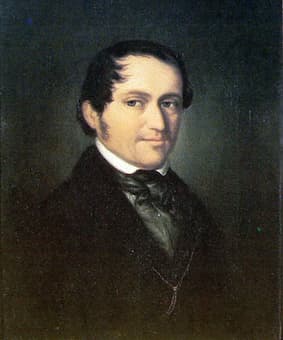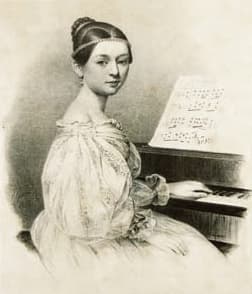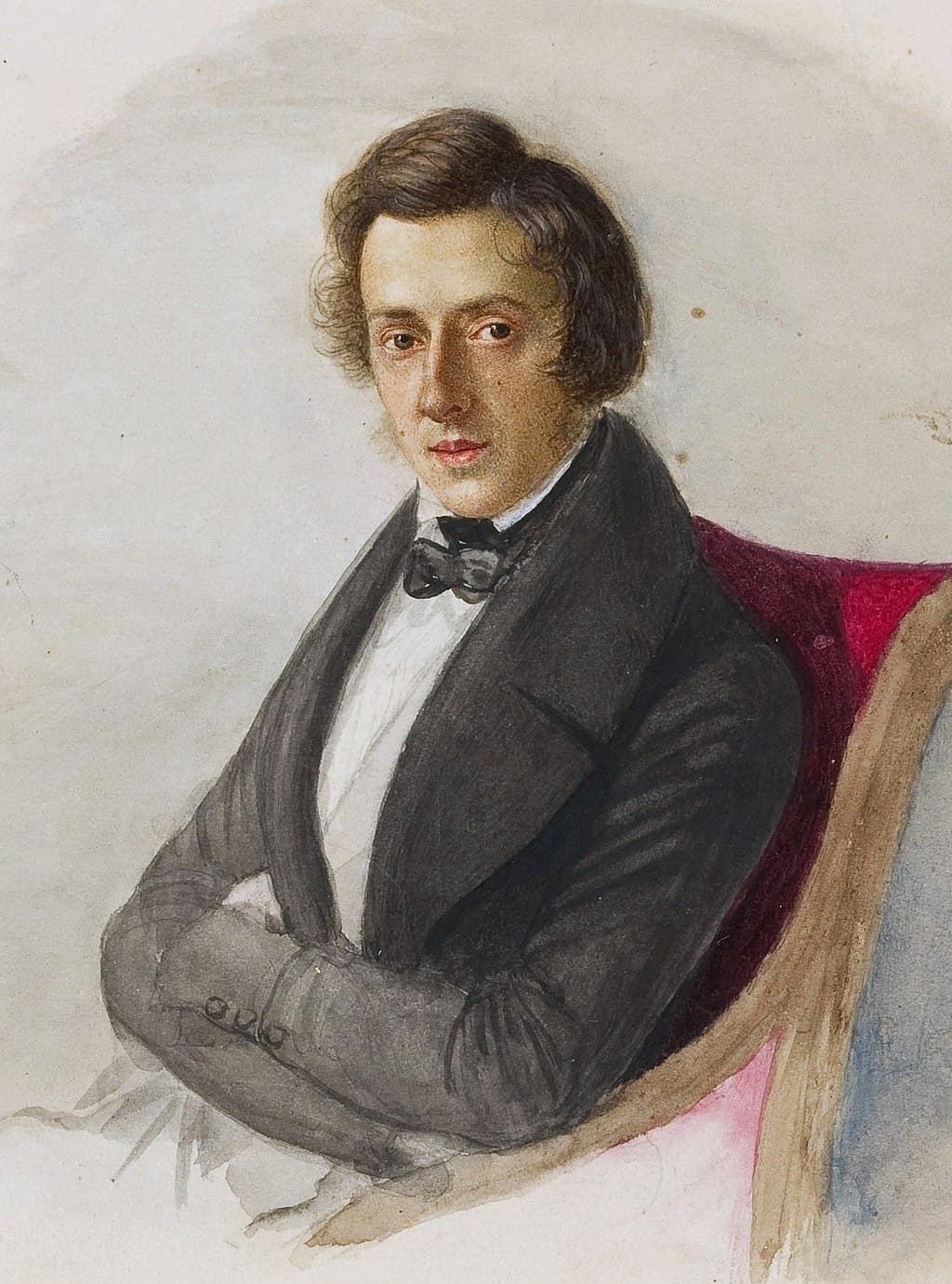This is a tale of two piano virtuosos.
Frédéric Chopin was born in Poland in March 1810, while Clara Wieck (later Clara Schumann) was born in September 1819.

Friedrich Wieck
These two great pianists grew up to become giants in their field. Although Chopin’s career came to an early end when he died young in 1849, Clara lived until 1896, and she spent the rest of her long career playing his music across Europe.
Today, we’re looking at the times they met, what they really thought of each other, and how Clara Wieck Schumann helped to make Chopin a household name.
The Wiecks – and Schumann – Discover Chopin’s Music
In the spring of 1830, when he was just twenty years old, Chopin published his “Variations on ‘Là ci darem la mano’”, a piano piece based on a theme from Mozart’s opera Don Giovanni.
Chopin: Variations on “Là ci darem la mano,” op. 2
The Variations were premiered in Leipzig on 27 October 1831. Twenty-one-year-old Robert Schumann was impressed, famously writing in a review, “Hats off, gentlemen, a genius!”
Robert Schumann’s teacher and mentor Friedrich Wieck was also impressed. He decided that his piano prodigy daughter Clara should start learning Chopin’s work.
Failed Fatherly Flattery by Friedrich Wieck

Clara Wieck at 15 years old
Twelve-year-old Clara, who at that time was preparing repertoire for a Parisian tour, learned the piece over the course of eight days.
The ever-conniving Friedrich wrote a positive review of the piece and sent it to a Parisian relative, telling him to pass it along to Chopin.
Friedrich thought that Chopin could pull strings to get it published in the influential paper Revue Musicale, thereby tilling the metaphorical musical soil for Clara’s arrival in Paris.
Unfortunately, the move backfired. Chopin found Wieck’s maneuvering heavy-handed and his writing dull. The review never appeared in the Revue. Clara would have to make her own way in Paris.
The Wiecks Arrive in Paris
Friedrich and Clara Wieck arrived in Paris in February 1832. Five days later, she performed for Chopin.
Despite her father’s heavy-handed management style, Chopin was impressed by her playing anyway.
He gifted her a manuscript of his E-minor piano concerto, prefacing with a note reading, “I am looking forward very eagerly to hear it performed by such a wonderful talent as yours.”
Chopin: Piano Concerto in E minor, Op. 11
A few days later, Clara was in the audience when Chopin performed both the “Là ci darem la mano” variations and the piano concerto.
In the diary that she and her father shared, she shared her impressions: “Chopin’s Concerto in E-minor is incredibly beautiful and original and is even well suited for a quartet.”
Clara and Friedrich soon returned to Leipzig. But the meeting had made an impression. Chopin’s music became mainstays of her repertoire.
Bringing Chopin to Leipzig

Portrait of Frédéric Chopin by Maria Wodzińska
In January 1833, at the age of thirteen, Clara Wieck gave a historically important concert: it was the first time she ever publicly performed works by her future husband Robert Schumann.
But Schumann wasn’t the only composer she championed during that concert. She also played eight of Chopin’s mazurkas.
It is believed that this was the first time these works had ever been played in Leipzig.
A little more than a year later, in May 1834, she played the Chopin E-minor concerto at the Leipzig Gewandhaus concert hall. She would return to the concerto frequently in the following years.
Interestingly, not everyone was a fan of Chopin. A critic named Ludwig Rellstab observed in 1834:
Clara has certainly great talent, but it is a pity that she is in the hands of a father who allows her to play such nonsense as Chopin.
Chopin Comes to Visit Leipzig
Chopin traveled to Leipzig in September 1835. He was only planning on staying in the city for a day, and came to see the Wiecks two hours before he was scheduled to leave town.
Friedrich was insulted by what he believed to be Chopin’s disrespectful and deliberately rushed schedule. In a bizarre power play, he sent Clara out so that Chopin would in turn have to wait for her.
When she finally returned, she sat down at the piano and played a sonata by Robert, two Chopin etudes, and the final movement of her own concerto.
Clara Schumann: Piano Concerto in A minor op. 7 (III. Finale. Allegro non troppo)
Again, despite Friedrich Wieck’s maneuvering, Chopin was deeply impressed by Clara’s playing.
Then Clara asked to hear a nocturne, so they switched seats and Chopin performed one for her. (Sadly we don’t know which one.)
Judging by her writing, she admired Chopin’s playing deeply, but felt that his physical frailty was affecting his technique, noting that he “was able to produce a forte only with a convulsive movement of his whole body.”
Chopin’s Next Visit to Leipzig
Chopin returned to Leipzig a year later, and came to visit the Wiecks and Schumann again. Friedrich reported of the visit:
Chopin surprised us; he listened to all of [Clara’s] op. 5 and 2 Mazurkas and the Ballade from op. 6 as well as the concerto, op. 7. He was delighted, expressed himself enthusiastically and left us, very moved… He took op. 5 with him then and there and left an Albumblatt for Clara.
Clara Wieke-Schumann: Op. 5 – Characteristic Pieces
A couple of weeks later, Robert Schumann reported in a letter to one of his former teachers:
It is moving to watch him sitting at the piano. You would really love him. But Clara is a better virtuoso and almost gives his compositions more importance than he does himself. Think of the perfect, a mastership, which apparently is not aware of itself at all.
Clara Wieck Schumann Becomes a Chopin Champion
Clara continued to hold Chopin’s music close to her heart. In 1840, the year she turned twenty-one, she performed Chopin’s Piano Concerto in F-minor.
All told, she championed his music for over sixty years. She and Franz Liszt, not Chopin himself, were the two performers who firmly cemented Chopin’s reputation. If those two had never lived, it’s possible that we might not know the name of Chopin today.
Over the course of her life, Clara Wieck Schumann went from seeing Chopin go from obscure twentysomething composer to beloved Romantic Era titan…in large part due to her own tireless devotion to promoting his music.
In fact, her final concerto performance – on 7 November 1890, when she was seventy-one years old – was of the Chopin F-minor concerto.
For more of the best in classical music, sign up for our E-Newsletter




